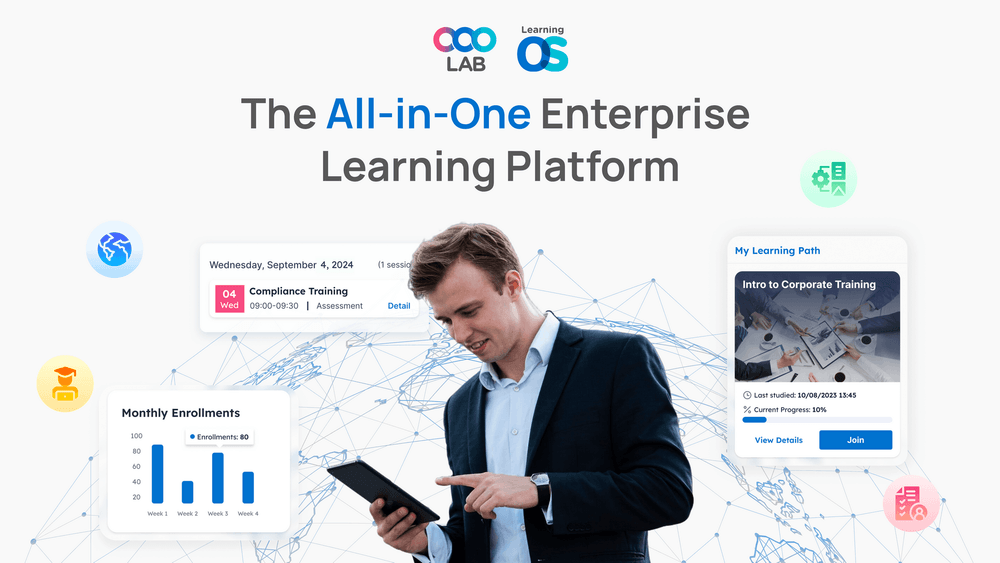

The finance and banking industry is evolving rapidly due to digital transformation, regulatory changes, and increasing cybersecurity threats. Financial institutions must ensure that employees are well-trained in compliance, risk management, customer service, and financial products to maintain trust and operational efficiency. However, traditional training methods often fall short, leading to inconsistencies, high costs, and difficulties in tracking employee progress.
A tailored Enterprise LMS provides a scalable, data-driven approach to training, allowing finance and banking enterprises to deliver personalized learning experiences, ensure regulatory compliance, and enhance workforce skills. By leveraging an LMS, financial institutions can streamline learning, improve employee performance, and stay competitive in a highly regulated industry.

Financial services firms operate in one of the most regulated industries in the world. Employees must stay updated with compliance requirements such as AML (Anti-Money Laundering), KYC (Know Your Customer), PCI DSS (Payment Card Industry Data Security Standard), and GDPR (General Data Protection Regulation). Failure to comply can result in severe penalties, legal consequences, and reputational damage.
Additionally, financial institutions must train employees on risk management, cybersecurity protocols, fraud prevention, and sales strategies. With the rise of fintech and digital banking, professionals must also develop expertise in emerging technologies such as blockchain, AI-driven fraud detection, and digital payments. A robust Enterprise LMS ensures that financial institutions can deliver consistent, up-to-date training while tracking compliance and employee progress in real time.
>>> Read more: What is an Enterprise LMS
>>> Read more: Customization Options for Enterprise LMS
Regulatory compliance is a top priority in finance and banking. An Enterprise LMS automates compliance training by providing:
Real-time tracking of completed courses to ensure employees stay updated on regulations.
Automated certification management to track expiring licenses and required renewals.
Customizable compliance courses that align with changing legal and financial regulations.
A report by Gartner found that 73% of financial firms struggle to keep up with compliance training requirements. An LMS helps streamline compliance education, reducing the risk of regulatory violations.
Cyber threats and financial fraud pose significant risks to banking institutions. A specialized LMS provides interactive cybersecurity training, helping employees:
Recognize phishing attacks and fraudulent transactions.
Understand secure data handling practices and implement multi-factor authentication and encryption techniques.
According to a Gallup (2022) survey, 80% of financial firms experienced a cyberattack in the last year, emphasizing the need for ongoing cybersecurity training through an LMS.
A customizable LMS supports sales training tailored for financial services, ensuring employees understand:
Investment products, insurance policies, and loan offerings.
Customer relationship management (CRM) strategies.
Advanced negotiation and objection-handling techniques.
By integrating role-based training, new hires can focus on basic banking operations, while senior relationship managers receive advanced sales training for high-net-worth clients. A study by McKinsey & Company (2023) found that financial firms implementing personalized sales training saw a 25% increase in revenue per employee.
An Enterprise LMS powered by AI-driven learning personalizes employee training by:
Analyzing learning patterns and recommending relevant courses.
Adapting content delivery based on employee performance and knowledge gaps.
AI-based LMS solutions improve knowledge retention and ensure employees focus on critical skills needed for their roles.
One of the major advantages of an Enterprise LMS is its ability to provide real-time analytics on:
Employee engagement with training content.
Course completion rates and assessment scores.
Skill development trends across departments.
Managers can use data-driven insights to refine training strategies and improve employee performance. According to a report by Deloitte (2023), organizations leveraging data-driven learning saw a 35% improvement in workforce productivity.

>>> Read more: Common challenges when implementing an Enterprise LMS
>>> Read more: Steps to implement an Enterprise LMS
>>> Read more: Enterprise LMS - revolutionizing corporate training and development
Before implementing an Enterprise LMS, financial organizations must conduct a training needs analysis by:
Assessing current employee skill levels.
Identifying gaps in compliance knowledge and risk management expertise.
Aligning training content with regulatory requirements and business goals.
A structured approach ensures that LMS solutions address both compliance needs and employee career development.
Selecting the right Enterprise LMS for finance and banking requires evaluating:
Regulatory compliance support (GDPR, AML, KYC).
Data security measures (encryption, access control).
AI-driven learning capabilities for personalized training.
Integration with HR and performance management systems.
A cloud-based Enterprise LMS enables employees to access training from any device, ensuring flexibility and accessibility.
A finance-focused Enterprise LMS allows organizations to segment training for:
Frontline staff (customer service, retail banking, credit analysis).
Risk managers (compliance, fraud prevention, cybersecurity protocols).
Investment advisors (wealth management, financial planning).
Customized learning paths ensure that employees receive role-specific training, leading to better knowledge retention and performance.
An Enterprise LMS can be integrated with sales training to:
Enhance cross-selling and upselling strategies.
Boost customer engagement through well-informed sales interactions.
By aligning LMS training with sales objectives, financial institutions can drive revenue growth and client satisfaction.
After deploying an Enterprise LMS, financial organizations must monitor:
Training completion rates to ensure compliance.
Employee performance metrics to assess skill development.
Continuous evaluation allows firms to refine learning strategies and stay ahead of regulatory and market changes.
The finance and banking sector requires a tailored Enterprise LMS to enhance compliance training, manage risks, and improve workforce productivity. By leveraging AI-driven learning, personalized training paths, and real-time analytics, financial institutions can bridge skill gaps, mitigate compliance risks, and empower employees with the knowledge needed to excel.
With evolving financial regulations and increasing cyber threats, investing in a customizable Enterprise LMS is a strategic move for long-term success. Institutions that adopt a digital-first training approach will gain a competitive edge in compliance management, risk mitigation, and financial product expertise, ensuring sustainable growth in the digital era.
At OOOLAB (pronounced 'uːlæb'), our mission is to make complex learning operations simple. We aim to positively impact the lives of over 1,000,000 learners and educators by the end of 2026.
OOOLAB's LearningOS provides educational institutions and corporate enterprises with an all-in-one solution to create and deliver engaging learning experiences.
We meet organizations' needs or support your growth. We provide undivided attention. We provide:
1. Dedicated success manager: We offer direct communication with a real human who'll discuss your enterprises unique learning operations and goals.
2. Personalized setup: Our team will help you transition to LearningOS on your schedule, one step at a time.
3. Around the clock support: Get help from us any time, and in any time zone.
We have recently launched a new AI training tool, Skill Quotient OS, designed to elevate hybrid training to new heights. It offers role-play exercises with scenarios and assessments.This tool can apply in sales training, corporate development and customer support training in any industry.
Reach out to us at: LinkedIn, Facebook, Instagram, Tiktok, X
1. What are the main benefits of LearningOS
Our platform is easy to use and automates all aspects of your learning operations. It efficiently manages complex tasks, allowing you to concentrate on delivering exceptional learning experiences.
2. What main features does LearningOS offer?
Our all-in-one software solution combines a Content Management System, a Learning Management System, content authoring tools, and a mobile friendly Learner Portal.
3. Can your platform be used for corporate enterprises?
Absolutely! LearningOS is an Enterprise LMS is a great fit for corporate learning. In fact, we have clients with up to 700,000 employees using LearningOS! Upskill your workforce by creating and assigning interactive eLearning content while effortlessly tracking employee progress.
4. Who currently uses your platform?
Our platform is currently used by over 120,000+ learners, parents, and employees across 21 countries worldwide!
5. What types of content options are available on your platform?
We offer ready-to-go curriculums for various educational purposes or our expert design team can build a custom course for you. We can also upload your existing learning materials and enhance them digitally.
6. What is unique about LearningOS?
Our platform, designed by educators for educators, provides you with all the tools you need to scale. Build and promote your own hybrid and blended learning courses and save money on licensing fees by owning your own proprietary content.
7. How can I get started?
Schedule a meeting with our experts and we’ll talk about how our platform can address your unique challenges and help to grow your business.